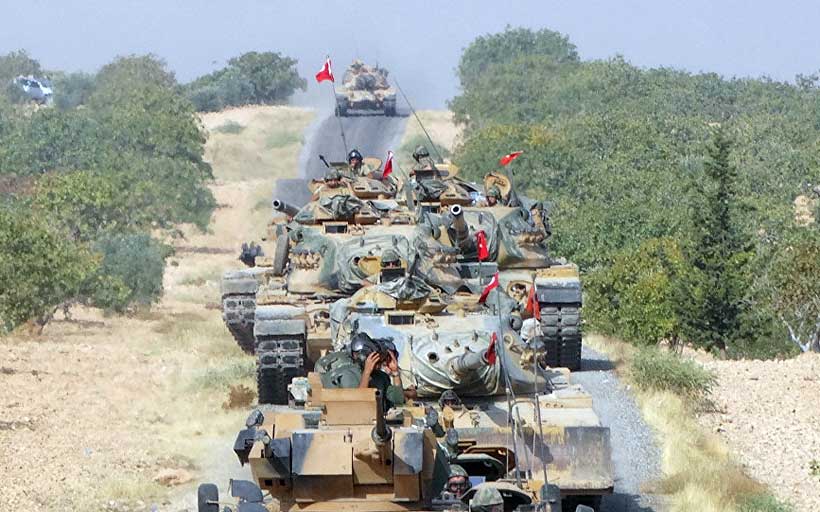With ISIS on the run in the desert of South Syria, Al Qaeda’s affiliated jihadists in Idlib brace for the final assault by the combined forces of the Syrian Army, the Russian air force and the Iranian proxies. The president of Turkey, who fancies that he could be the new Caliph himself, implores the United States to join in the quashing of Bashar Al-Assad “before he kills again.” While there are some common of interests between Washington and Ankara, the United States gains nothing by assisting Erdogan’s Syrian gambit, because the cure he would bring could be worse than the disease. On the other hand, the President’s call five months ago to pull out of Syria altogether would be risky.
Idlib, Home to some three million people, half of whom are the displaced people running away from Assad’s atrocities, has also been an uncertain sanctuary for former Salafist-jihadi fighters, who may number 30,000 according to the US military. The UN special envoy for Syria estimates there are around 10,000 al-Qaeda affiliated fighters in Idlib, most of whom under the control of Hay’atTahrir al-Sham, (HTS), al-Qaeda’s latest rebranding, which hold nearly 60 percent of the city. The rest of Idlib is controlled by Turkey-backed militias. Turkey has a dog in this fight; the Western coalition does not.
Armies of four major players in the area vie for territory: Syria, Russia, Iran, and Turkey. Ankara agreed to help create de-escalation zones and 12 observation posts to protect civilians during the Astana peace talks in January 2017.
The battle for Idlib has differing objectives for the four armies on the field.
For Syria, the Idlib offensive allows al-Assad to kill thousands of Sunni rebels with barrel bombs, Russian airstrikesand Iranian militias, all with an unforgettable exclamation point. Brutal, yes, but it’s a strategy that has worked in the area for 5,000 years.
For Russia, driving on Idlib will be the final blow against the rebels and the guarantee of Russia’s permanent military bases in Tartus and Latakia.
For Iran, conquering Idlib would remove the last major obstacle to the Shia land bridge from the Persian Gulf to the Mediterranean Sea. Iran wants to extend its influence in the region and have uninterrupted access to Lebanon to boost Hezbollah’s power and its supply chain.
For Turkey and Erdogan, the Idlib strategy is complicated. It is estimated that an assault would drive more than 700,000 people toward the Turkish border. But Turkey, with more than 3 million refugees already and a spiraling financial crisis, won’t accept another humanitarian flood, according to Turkey’s foreign minister. Additionally, Turkey has been investing in northern Syria to extend its influence including in Idlib by providing humanitarian aid via NGO’s such as the IHH (Humanitarian Relief Foundation), opening schools, and sending teachers and imams to establish a favorable Turkish sphere of influence for long-term investment; therefore, Turkey fears to lose the ground it already controls.
Since January 2017 Erdogan anticipated that he could trust Russia and Iran and have a military presence in the region per the Astana agreement. According to Erdogan, Turkish military presence would thwart a Syrian offense against Idlib. He also wanted to extend Turkish control of northern Syria along the Turkish border, including the cities of al-Bab and Afrin, in an effort to block a Kurdish-controlled corridor along the same border. On both counts, Erdogan miscalculated.
Erdogan has been playing a dangerous game both at home and abroad. He closely but surely distanced Turkey from the West; particularly the U.S. Under his control, Turkey has become an authoritarian state, jailing thousands of people on false charges. Among the victims are hundreds of journalists, including several Western reporters and an American Christian pastor.
The fact is, Turkey no longer behaves as a U.S. ally. Under Erdogan, Turkey allowed more than 40,000 foreign fighters to pass through her borders to join Salafist Jihadi terrorist organizations in Syria and Iraq from 2013 to 2016. Though Turkey may be an enemy of Assad, the Erdogan regime has been a silent partner with Russia and Iran.
Erdogan’s disdain for the United States also stems from a New York federal court case involving the Iranian embargo. Turkish Halkbank and gold trader Reza Zarrab, under the orders of Erdogan, helped Iran to circumvent the American embargo banning the sale of Iranian oil and transferring millions of dollars to Iran and its proxies. Turkey’s president likely thought the Trump Administration would kill the Zarrab case.
Realizing his ill-intended policies and demands were not being met by the Trump Administration, Erdogan decided to play the Russia card. Turkey, a NATO member nation, recently purchased Russian s-400 missile systems amid US protests and will install these weapons systems in 2019.
The U.S. should set its priorities in the region based on international and humanitarian values and to eradicate the conflict in the long run by promoting the protection of the civilians first. U.S. military assets in Syria should stay put for four reasons. First, to act as a deterrent to al-Assad’s use of chemical weapons and other atrocities. Second, to frustrate Turkish expansion and control of Syria’s northern border. Third, to control Iranian ambitions in the region. Fourth, to assist the local allies to prevent the re-emergence of Islamic State 2.0.


